|
Before I left for Palermo, an old friend of mine asked, "Of all the possible causes, why Gaza?" It was a question echoed by the owner of the place where the Al Awda was docked the last few days before departing. He asked a couple of times whether we had anything to do with the efforts to rescue migrants sailing from Libya. (I overheard him on the phone talking to someone, explaining that we were "pacifists"). In Italy, as an Italian, it's a difficult question to answer. There are other issues, much closer to home, which seem urgent: the worsening domestic climate in Italy, with the increasingly noxious xenophobia promoted by Interior Minister Matteo Salvini being the most prominent (by no means the only) one. However, for me, the answer is simpler, because I am a U.S. citizen. Israel is by far the leading recipient of U.S. military aid, to the tune of over $3 billion a year, and it receives crucial diplomatic, bipartisan support from our government. If we could move public opinion in the United States against Israel's routine violations of international law (the blockade of Gaza, settlements in the West Bank, their separation wall, and more broadly the occupation of Palestine), there is every reason to believe that those violations would stop. Furthermore, working on the case of Palestine helps to expose the underlying hypocrisy of U.S. foreign policy more broadly: It was hard to listen with a straight face as Vice President Biden called on Russia to end its illegal occupation of Crimea in 2015, knowing that our government provides crucial support for the longest military occupation in modern times -- though all the national media successfully did so. Media behavior will be unsurprising to anyone who has read the indispensable "Manufacturing Consent" by Herman and Chomsky. I think it's worthwhile to bring up Herman and Chomsky's "Propaganda Model" particularly in this case because, even in "liberal" Bellingham, I have heard the anti-semitic lie that "the Jews control the media" -- a lazy, bigoted, outdated explanation for a phenomenon that is much better understood by reflecting about the corporate institutional structure of the media. Returning to why should we care about the Israeli occupation of Palestine in particular, when there are so many other issues: The moral thing to do is to reflect on one's own responsibilities, rather than accusing others. So for example, when we name Israel's polices as "settler colonialism," for a citizen of the United States the appropriate reason would be to reflect back upon the similarities to our own history. There is a widely circulated map that shows the decreasing amount of land controlled by Palestinians. I found out in Palermo that it was explicitly inspired by a similar map that showed the decreasing amount of land controlled by Native peoples in what is today the United States. Even the official narratives are very similar: our own Declaration of Independence refers to the "merciless Indian savages" who were defending their homelands from an expanding settler colonial enterprise. In today's words, the Natives would probably be described as "terrorists." Perhaps few other incidents highlight the closeness of Israel's ties to the United States (and reinforces our resposibility for speaking out about U.S. support for Israel) as the Israeli attack on the USS Liberty in 1967. Israel was at war with its neighbors (a war that Israel started, with tacit U.S. approval, at the end of which it was occupying the West Bank and Gaza), and their air force and navy attacked the USS Liberty in international waters, killing 34 people, wounding over 100, and severly damaging the ship. One of the survivors, Joe Meador, is sailing on the Al Awda towards Gaza. In my limited interactions with him was a gentle, soft spoken man with a sharp sense of humor. At the end of lunch on Friday, he deadpanned that he had not yet received his meal (though of course he had), and we all laughed and said that he would probably find that same composure handy when he will be interrogated by the Israeli Defense Forces. Discussing the exact details of the USS Liberty incident would take us down a long, unnecessary road. But it's instructive to compare it to another, much more famous naval incident, that took place in the Gulf of Tonkin (Vietnam) in 1964. (Veterans for Peace sponsored a play about the Gulf of Tonkin incident at Bellingham High School a few years ago). President Johnson used a (likely fictitious) attack on the USS Maddox in the Vietnamese Gulf of Tonkin by the Vietnamese navy to greatly expand the scope of the U.S. invasion of South Vietnam. Notably, no U.S. service members were killed, and the USS Maddox suffered only minimal damage. On the other hand, the very real and deadly attack on the USS Liberty is virtually unknown to the general public, and merely represents a momentary blip in the decades-long relationship between the United States and Israel. Again, it's worth saying that the difference in our governments' reactions in the two cases is best explained by the logic of power: the lives of U.S. soldiers and sailors are completely expendable in the pursuit of global domination, they only become sacrosanct when they are attacked by official enemies and can be used to stir up xenophobia and promote war. It's worth saying this to pre-empt and refute the anti-semitic trope that "the Jews control the government," which was even hinted at in the Cascadia Weekly some years ago. (To learn more about Israel's subservience to U.S. global power, as well as more background about the 1967 war, I recommend "The Fateful Triangle" by Noam Chomsky, available in the WPJC library). What about the other people who were involved in the flotilla? What were their motivations for participating? I certainly can't speak for them, but fortunatly they have spoken for themselves: Below is an interview with Zohar. The media team was preparing statements and videos from the other participants as well. Written by Matteo TamburiniI grew up in Pistoia, Italy. My father and all his family were Italian. My mother’s family was primarily composed of Irish immigrants to the United States. Lucky to have dual citizenship, I moved to the United States in 1999 to go to college. Since 2009, I have been teaching (and learning) Mathematics at Northwest Indian College, a college chartered by the Lummi Tribe. I have served on the Board of the Whatcom Peace and Justice Center since 2010. My primary cultural commitment is my dedication to study the Afro-Brasilian artform Capoeira Angola, under the guidance of my teacher, Mestre Silvio Aleixo dos Reis, of the International Capoeira Foundation, who I have been learning from since 2008. Berta Cáceres is most known for her fight to stop the construction of a single dam in southwestern Honduras. This fight is emblematic of the larger struggle Berta devoted her life to, which she waged against a system of oppression made up of corrupt governmental institutions, US-backed security forces, and transnational corporations. Berta fought for environmental rights and the right to self-determination for her people, the indigenous Lenca, and for all the people of Honduras. Berta founded the organization COPINH, or the Council of Popular and Indigenous Organizations of Honduras, in 1993. COPINH’s purpose is to defend the Lenca people and the waterways and natural resources they depend on from destructive logging, mining and hydroelectric megaprojects, and from the military police that use repression and violence to defend these projects. Through COPINH, Berta revitalized the Lenca culture, and organized her people to protest against land grabs by logging and hydroelectric companies. The English version of COPINH’s website states, “We have stopped at least 50 logging projects that would have deforested our land and forests and 10 hydroelectric dams that threatened Lenca communities, including the huge Tigre Dam project on the border of Honduras and El Salvador.” Berta and other community members led COPINH in a blockade against the construction of the Agua Zarca dam, which would have polluted the waters of the Gualquarque River, seen as sacred by the Lenca. Combined government police and military forces used violence to attempt to silence the protestors, and in 2013, Tomas Garcia Dominguez, a leader of COPINH, was killed by a member of the government of Honduras. Nevertheless, Berta and COPINH persisted. The blockade was ultimately successful, and construction of the dam ceased once DESA, the Honduran corporation behind the dam, pulled out of its contract with the Honduran government. However, the threat to COPINH and its leaders only increased. Berta repeatedly received threatening text messages; she believed that her actions were being monitored and that she was at the top of the Honduran government’s hit list of activists. After going into hiding briefly in 2013, Berta said: “They follow me. They threaten to kill me, to kidnap me; they threaten my family. That is what we face.” Berta asked the government of Honduras for protection, but received essentially none. “She had filed 40 reports of threats against her. They knew she was under threat, but they failed to protect her,” said Berta’s mother, Austraberta Flores. In 2016, Berta was killed by six gunmen who had broken into her own home. Berta’s murder resembled an organized military operation, and in fact three of her assailants had ties to the Honduran military. One of these three had previous worked as head of security for DESA, and a fourth suspect was a manager of the dam project. Berta died at the hand of the same corrupt forces she lived to defeat, but her message and spirit are enduring. Even now, Berta’s face can be seen spray-painted on buildings in COPINH’s stronghold, the city of La Esperanza, with the words “Berta Vive!” spray-painted underneath. Berta’s family carries on her fight, both within Honduras and in the the United States, and during protests, organizers and activists continue to chant: “Berta didn’t die, she multiplied!” As I watched Berta Cáceres’ acceptance speech of the 2015 Goldman Environmental Prize, I was struck by the universality of her words. She spoke of the Lenca’s connection to the spirits that protect their rivers, and of the sacrifice made by the Lenca to protect the rivers, in turn protecting the well-being of humanity and of the planet. She spoke of the need to wake up, to shake ourselves free of the shackles of capitalism, material greed, racism, and patriarchy, in order to prevent us from destroying ourselves. Berta’s message is the one that we need to listen to if we are to reclaim our world from the forces that threaten to destroy it—if we are to create a world that preserves indigenous cultures and the environment instead of corporate profit and violence. If you’re interested in getting a more in-depth look at Berta’s life and the circumstances surrounding her death, the following films are great resources: Written by Sam BottmanAbout me: My name is Sam Bottman. I started volunteering at Whatcom Peace & Justice Center in May 2018 after hearing about the organization online and getting excited about its mission. I’ve been interested in learning about US foreign policy for a while, and the true motivations behind the United States’ involvement in the government of Honduras and those of other countries. Through volunteering with WPJC, I hope to spread awareness of the injustices that my country is implicated in and join alongside those organizations and individuals who are fighting to end them. 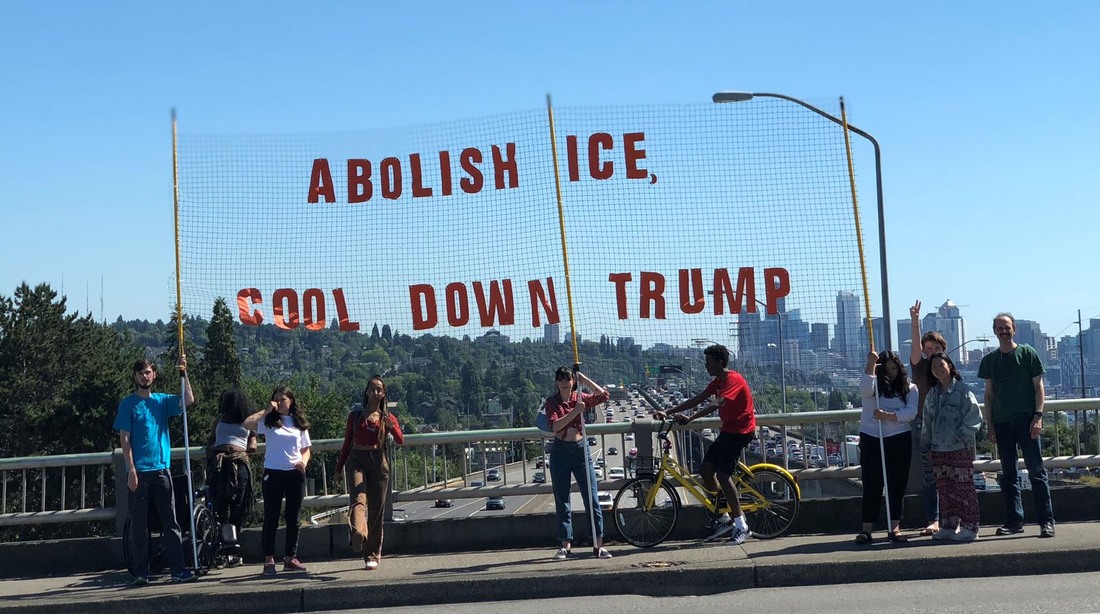 As a group of high schoolers and college students, we used active nonviolence to do direct action on recent immigration policies on family separation and detention. We made the banner together with the script of: "Abolish ICE, Cooldown Trump" and went on the bridge above I-5 facing the cars going out from Downtown Seattle. As a group of high schoolers and college students, we used active nonviolence to do direct action on recent immigration policies on family separation and detention. We made the banner together with the script of: "Abolish ICE, Cooldown Trump" and went on the bridge above I-5 facing the cars going out from Downtown Seattle. "Nonviolence is a way of life for courageous people." -Martin Luther King, Jr. The Mike Yarrow Peace Fellowship Intensive Training was held from June 27 to July 3, 2018, on the University of Washington campus. The Mike Yarrow Peace Fellowship is a one-year long project by Western Washington Fellowship of Reconciliation in support of guiding and mentoring young activists to advocate for their passion on one particular social issue and to bring direct actions based on the principles of nonviolence. I was elected to be a peace fellow this year. During the intensive training, I was deeply inspired and empowered by Dr. King’s profound wisdom and resilience. Dr. King wrote: “Nonviolence is a way of life for courageous people.” Nonviolence is not just a tool for us to fight against external injustice; as Dr.King wrote, this quote as the first principle of nonviolence, nonviolence should firstly be our way of mind, our way of heart, and our way of life. Nonviolence, by definition, is a creative power for justice and the wellbeing of all that uses neither passivity or violence. Nonviolence is a profound tool to gain justice and peace for our beloved community with the intention of avoiding internal violence of the spirit and external physical violence. Nonviolence action is not passive as it appears to be, instead, it keeps alive an active mind and the spirit of self-chosen endurance on understanding. In real life, one way this comes up for me is when someone attacks my identity. My default reaction is to get offended and start to defend myself by closing myself up. I might even start to attack the person back, out of anger. Instead of starting to get defensive and trying to fight back right away, Kingian Nonviolence suggests solving the conflict based on seeking mutual understanding and mindset of peaceful endurance. Following that, I might start to ask myself: “Why did that person attack me?” Maybe they had an unpleasant or horrible experience with people who share the same identity as me, or they have subconsciously learned from the collection of mass media, customs, and social practices that promote stereotypes and prejudices toward to the people who have that particular kind of identity. Then I would start to have a conversation by asking questions and try to understand that person’s experience. That might lead me to understand the reason behind their behavior and eventually bring the healing and truth that they need to hear. In the end, I could change someone’s prejudiced view on a certain identity of a group of people, and that is something tremendous. I was also deeply touched by Dr. King’s writing about how to forgive and love the ones who oppress us from seeking mutual connection and common ground. By reflecting on my own personal journey, I have found that I have been carrying the weight of pain from my past experiences by general society and the ones who I love and have loved the most. After awhile of carrying the weight, I stopped recognizing this pain as baggage, as something extra, as something that does not belong to me. I have been trying hard to naturalize this pain by forgetting about it and keep going on with my life, but it only gives me more and more weight until my heart starts to lose authentic feelings toward to new pain. Since the training, meditating on Kingian Nonviolence has freed me from my baggage by forgiving pain instead of just trying to forget. It connected me with an unique perspective of humanity, which we, as humans, are all standing on the same ground at some point where we are vulnerable and hurting, so forth it allowed us to seek help and connection from others. It offered me profound peace and rejuvenation as I continue to learn how to live a life of nonviolence. Living in the nonviolence way of life takes great courage and strength, but the outcome is freeing and transformative. Humbly, this is what I have learned from the week training of nonviolence. Written by Kexin Cherie ZengWWU student, Sociology Department. I am sitting in the airport in Catania, reading the newspaper, heading back home after spending three days with the crew, passengers, and supporters of the ship 'Al Awda', as it prepares for its voyage to Gaza. I am reading 'Il manifesto', the newspaper of the Italian left. for several years, it was not available in Sicily, it has just returned to the newsstands in the past couple of weeks. There is a headline on the front page: 'Israel and Hamas, on the verge of war'. My experience around the Al Awda gives me a different perspective about the situation. The Freedom Flotilla coalition continues to highlight Israeli scholar Baruch Kimmerling's description that Gaza is today the largest concentration camp in the world. How can we describe the struggle between prisoners and guards as a 'war'? A prisoner's revolt is a more fitting description. And the inevitable Israeli air strikes are not part of a 'war': They are a brutal form of disproportionate retaliation. Watching and talking about the Al Awda is a powerful reminder of the complete lack of symmetry between the two sides. The activists have been at work since last December to prepare boats to accomplish a seemingly straightforward thing: Sail about across the sea and bring some medical supplies to another country. Sitting on the dock, we struck up a conversation with a pair of French people who spend their summers sailing all over the Mediterranean, going from port to port, from country to country: Tunisia, Algeria, Morocco...they describe it as the most natural thing in the world. But trying to get to Gaza requires, among many other things, trying to find a group of people of international stature (a member of the Swedish parliament, journalists from a variety of outlets, retired U.S. diplomats, Nobel Peace prize winners...), and even then, facing the near certainty of being intercepted by the Israeli navy in international waters, detained, interrogated, and finally expelled. Without being beaten, if they're lucky. It requires hours of legal preparation, and (as I recently learned) having a plan in place to have some point-people plan to set aside their lives for days so that they can stay in contact with the passengers' next of kin to inform them of any developments after they have been detained. And more. As a U.S. citizen, this is infuriating. Everyone agrees: Israel could not behave in this way without the amount of military, financial, and diplomatic support it receives from the United States. And yet, after every flare-up of rebellion from the prisoners in Gaza, what we hear from our politicians is that 'Israel has a right to defed itself' - which in the real world means: 'The people who operate the largest concentration camp in the world have the right to inflict brutal and disproportionate retaliation against the prisoners'. The United Nations has issued a report saying that, due to a lack of water purification and public health infrastructure (destroyed by Israeli fighter jets, and impossible to reconstruct because of the Israeli blockade), Gaza will not be livable by 2020. Harvard professor Sara Roy describes the public health situation in Gaza by saying that 'the majority of the children of Gaza are slowly being poisoned.' And yet, since a militaristic Israeli foreign policy (within strict parameters dictated by the United States, directed against the 'appropriate' enemies) is a boon to the military-industrial complex, and the filters that shape media coverage (described by Herman and Chomsky in the indispensable book 'Manufacturing Consent') continue to operate, we get a perverted fairy tale about 'the only democracy in the region' fighting 'terrorists', as well as elected officials who see nothing to gain by raising their voices against any of it. I spoke with a young Italian on the dock, who shared that his view of the Israeli-Palestinian conflict is shaped for example by a Netflix show whose name I can't remember, told from the Israeli point of view, in which the heros are Israeli Defense Forces soldiers. And yet, even he expressed admiration for the intentions and the dedication of the freedom flotilla. I wonder if we can collectively pressure our representatives to do the same... Written by Matteo TamburiniI grew up in Pistoia, Italy. My father and all his family were Italian. My mother’s family was primarily composed of Irish immigrants to the United States. Lucky to have dual citizenship, I moved to the United States in 1999 to go to college. Since 2009, I have been teaching (and learning) Mathematics at Northwest Indian College, a college chartered by the Lummi Tribe. I have served on the Board of the Whatcom Peace and Justice Center since 2010. My primary cultural commitment is my dedication to study the Afro-Brasilian artform Capoeira Angola, under the guidance of my teacher, Mestre Silvio Aleixo dos Reis, of the International Capoeira Foundation, who I have been learning from since 2008. First: what an incredible, inspiring group of people. I feel honored to have played a small part in this mission. The collected life histories of the people who are working for this are nothing short of awe-inspiring. In the picture, I am with Zohar, in front of the Al-Awda. Zohar is an Israeli Jew who left Israel and has been spending the past decades fighting tirelessly for the Palestinian cause. I understand that this is at least her third sail to Gaza. She is 'the person in charge' of the Al Awda - I was informed discreetly before joining the group that I should not set foot on the ship until she had met me and vetted me. The picture was taken around 8 a.m. on Thursday morning, as we were sitting at the table, for a mix of public outreach and security. The concern over sabotage of the ships by Israeli special forces lingers everywhere, sometimes just under the level of awareness, other times very overtly. The same concern was described tome by Zaher Darwish, a Palestinian who has lived in Palermo, for over 50 years works for the main Italian Trade Union CGIL, and who was coordinating the Palermo campaign for the ships. I met him soon after arriving, and he put me to the test right away on Wednesday night, translating from English to Italian during a public meeting (which had earlier included the mayor of Palermo Leoluca Orlando and the Palestinian ambassador to Italy, Dr. Mai Alkaila). I translated for a Palestinian physician, who described the situation in Palestine in clinical terms: the 'Palestinian patient' is suffering from a disease: settler colonialism. Fortunately, as he described it, this is a common disease (and he quoted the United States, Liberia and Australia as examples, among others). He insisted that this is the only diagnosis that correctly describes all the symptoms (and he quoted an absurd IDF 'seek and destroy' mission that hunted for a dozen renegade cows that had been purchased by a village). I quickly found myself in the (somewhat unexpected) role of translator and 'cultural mediator': yes, many of the Italians there spoke some English, but my bilingualism was a definite asset. I quickly bonded with Shabnam Mayet, a South African Lawyer of South Asian descent, who I first saw directing the legal part of the nonviolence training that the participants underwent to prepare themselves for being arrested, detained and interrogated by the IDF. She has been working with a team on international humanitarian law cases, particularly trying to bring criminal charges against many heads of state, including President Obama (for his use of drones) and Narendra Modi (current President of India). Shabnam and I had a great time talking about social movements, joking about algorithms, and comparing the level of stress necessary to coordinate the legal part of this campaign toorgaizing her brother's wedding. The Al Awda was scheduled to set sail from Palermo to Messina on Thursday, but there was a mechanical issue with the generator, which prevented it from doing so. This created the additional problem that the ship's moorage (which is what a landlubber thinks a boat's parking spot is called) became no longer available, because the organization that had donated it had lpreviously leased it to someone else after the scheduled sailing date. The Palermo group worked frantically to secure another spot. I had volunteered to watch the boat from 7 to 11 p.m. (though I'm not sure how prepared I was to fight off some IDF commandos, another thing that Shabnam and I joked about a lot) and during my watch I had a brief but hilarious conversation with a Palestinian with New Zealand citizenship, Yusuf (sp?) about 'the Lord of the Rings'. Yusuf had come over to check on the boat with an Israeli Jew, Yonatan. The two of them had spent the 1 to 3 a.m. night watch singing songs together the previous night, and they jokingly lamented how THAT picture somehow was NOT on all the papers. There was a collection of very committed Jews on the ship, beyond Zohar herself: one from the Netherlands whose parents had survived Auschwitz, and who has been doing solidarity work with Cuba (among many others), another from France, with whom I spent a couple of hours under the canopy in front of the Al Awda talking about colonialism and my work at Northwest Indian College. Due to the ship's delayed departure, one of my tasks became to arrage ways for the people involved to engage with the city of Palermo, which I had never truly visited and which truly stunned me. I received these 'assignments' from retired Col. Ann Wright, who I had met in Bellingham when she came through on a tour to raise funds for this mission. Together with Shabnam, we arranged for a tour led by some migrant African youth, working through an organization called MoltiVolti (many faces) who also run a fantastic restaurant with a multiethnic staff, as well as coordinating with an awesome association of local artisans who create a space for community and hope in a city and a country in which young people, as well as people in their thirties like me, often feel like there is precious little of either. I would be remiss in my (inevitably incomplete) list of amazing people I met there if I didn't at least include Larry Commodore, a First Nations man from Chilliwack, Canada, and Joe, who is a survivor of the USS Liberty (look it up); and also Leslie, Lisa, Barbara and Sherri from the US who provided invaluable support as ground crew. More reading: https://chomsky.info/20060328/ https://www.commondreams.org/views/2007/12/23/israel-lobby-revisited Written by Matteo TamburiniI grew up in Pistoia, Italy. My father and all his family were Italian. My mother’s family was primarily composed of Irish immigrants to the United States. Lucky to have dual citizenship, I moved to the United States in 1999 to go to college. Since 2009, I have been teaching (and learning) Mathematics at Northwest Indian College, a college chartered by the Lummi Tribe. I have served on the Board of the Whatcom Peace and Justice Center since 2010. My primary cultural commitment is my dedication to study the Afro-Brasilian artform Capoeira Angola, under the guidance of my teacher, Mestre Silvio Aleixo dos Reis, of the International Capoeira Foundation, who I have been learning from since 2008. Nuclear weapons and their legacy are not as far in the past as I grew up believing. I learned this a few weekends ago after attending a workshop put on by Washington Physicians for Social Responsibility about nuclear weapons and their history in Washington State. The Marshall Islands, where the U.S. conducted 67 nuclear weapons tests between 1948 to 1956, is among the communities that continues to feel the impacts of Cold War-era military action. Learning about U.S. involvement in the Marshall Islands made me realize how many interconnections there are between nuclear war and social justice issues. The reproductive health outcomes of Marshallese women are still poor, even 62 years after the last bomb was tested. Cancer is the number two cause of death, with thyroid, cervical, and breast cancer being most prominent amongst women. Yet there are no permanent oncologists anywhere on the Marshall Islands. Pregnancies often end in stillbirths, miscarriages, and birth defects commonly referred to as “jellyfish babies.” Along with poor health outcomes, there are also many barriers to accessing healthcare for the Marshallese. Under a treaty known as a Compact of Free Association, COFA, Marshallese citizens are allowed to work and live in the United States without a visa. However, despite paying taxes, Marshallese citizens are barred from accessing Medicaid and Medicare under current federal law. Only those who receive health insurance through their workplace have access to care, and only very few have that opportunity. States can pass legislation that adds immigrants under COFA back into state Medicaid and Medicare programs. As of March 2018, only Oregon, Hawaii, and Washington State had passed any such legislation. As someone interested in reproductive health, it has been deeply troubling to learn about this through my participation in the workshop and subsequent research. It has become clear to me that more emphasis needs to be put on the cultural history and legacy of a population when serving in the healthcare field. The folks that tend to slip through the cracks of systems are the ones professionals have the least cultural knowledge of. Written by Hannah PetersHannah is a Western Washington University student and current militarism research intern at WPJC |
Contributors
We invite the WPJC community to contribute fact-checked submissions on local, national and global current events. Linking to original sources and articles is required. Submissions may be sent to [email protected] for review. Categories
All
Archives
May 2024
|
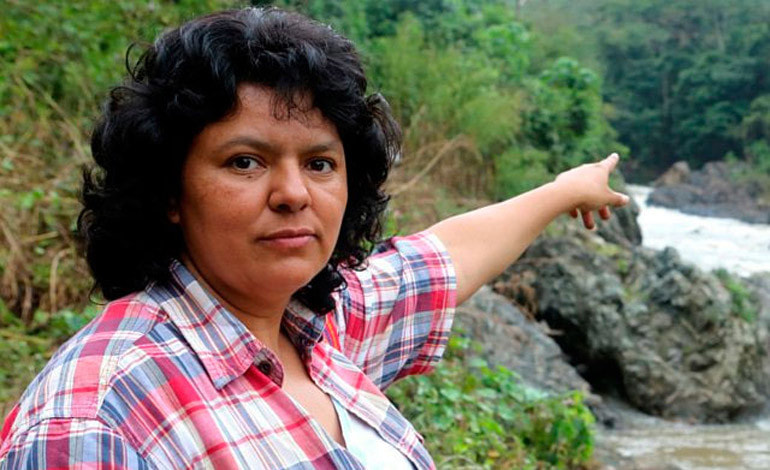
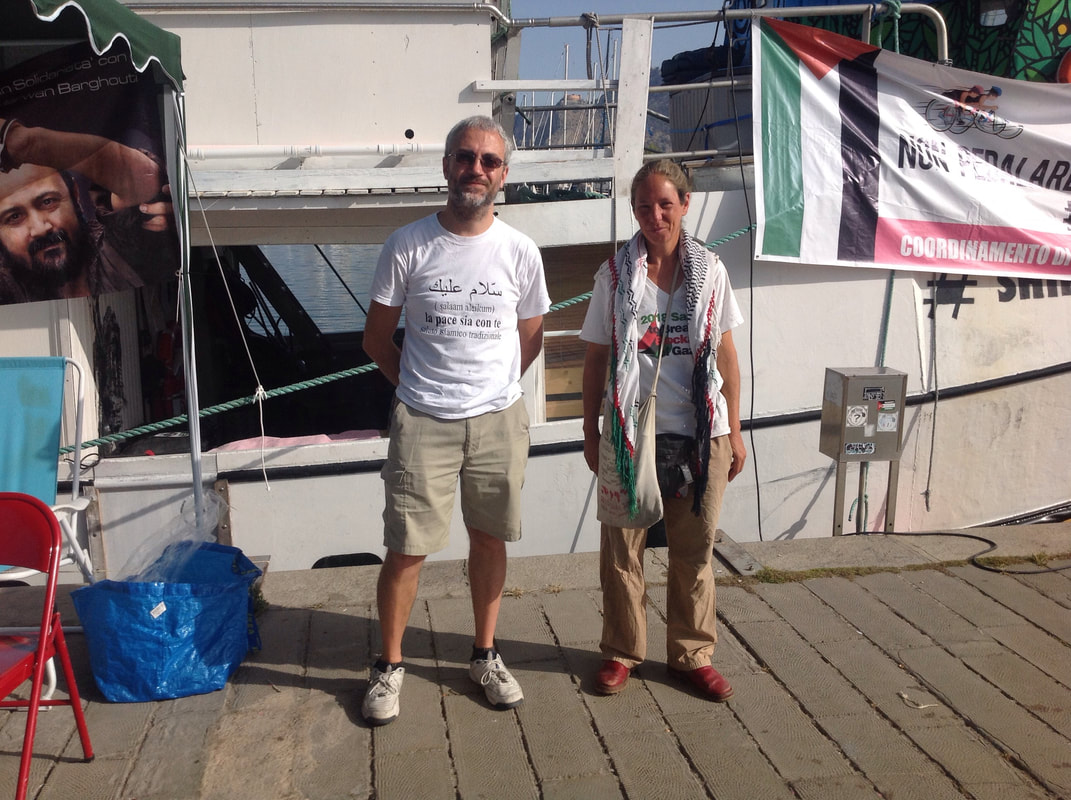
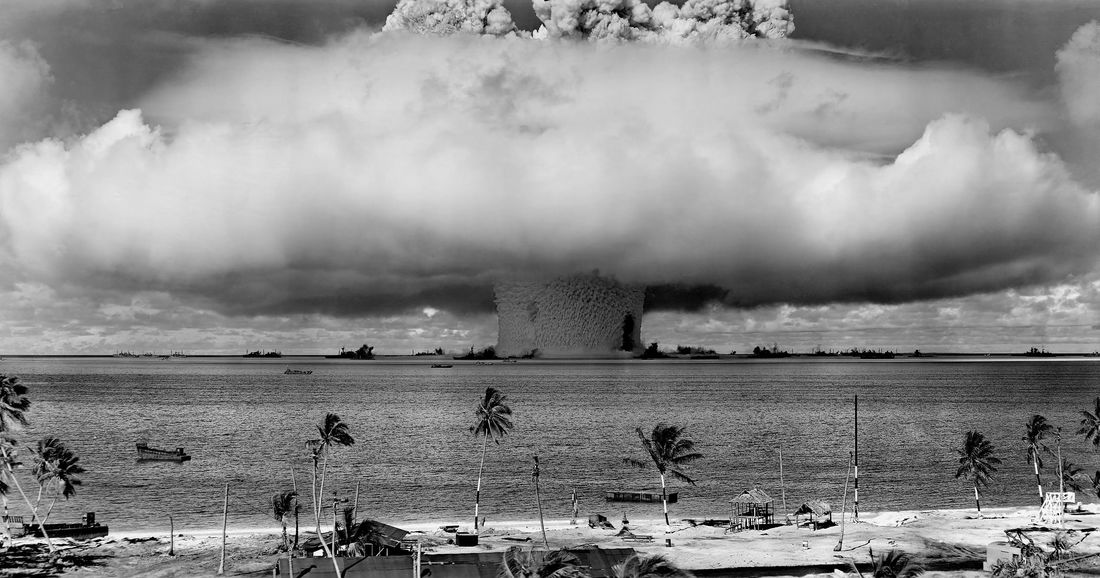
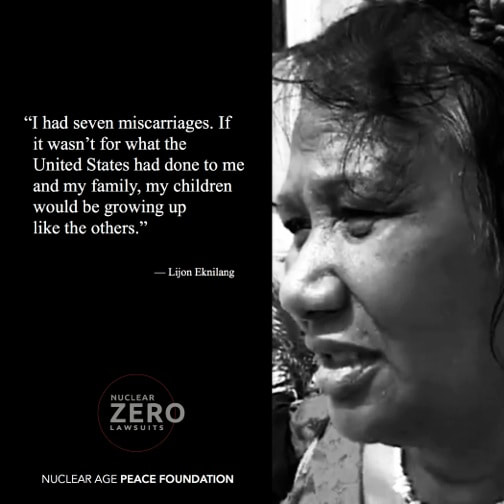

 RSS Feed
RSS Feed